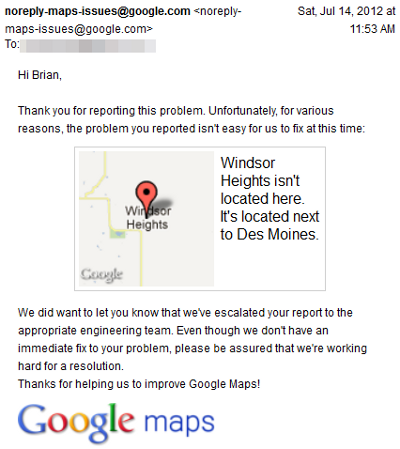Brian Gongol
The first mass audiences for self-piloted vehicles will probably be the trucking industry (if they can get convoys of trucks to line up with one another, they could potentially get away with far more truckloads being driven by far fewer drivers) and outside salespeople (for whom the ability to do more useful tasks as they go from place to place would be immediately monetizable). The road-weary salesperson of the past, plunking down at a desk in a hotel room late at night to catch up on paperwork and filling out orders, could be replaced by one who gets his or her work done from the road and whose car delivers him or her home safely at 1:00 in the morning. ■ Of course, there's always the problem of bugs -- like the ones that make it "difficult" to fix errors in Google Maps, apparently:

Among the (probably correct) observations: Google could be supplanted by a good search engine that satisfies a very specific audience. You don't have to win over the entire Internet-user audience to make a meaningful step forward.
Not because they're bad companies...but because many of them are being built so that no matter how many shares of the company you own, the founder still has control.
And how old have they been throughout the history of the modern games? Graphing enthusiasts have sought to answer that question.
Obviously, robots don't have emotions. But as we should expect to encounter them more in the future, technicians are working on ways of making them seem more humane so that we can use them more naturally. But it's going to take a while to get this right.
They're already doing it in some places. On the positive side, the technology certainly could be useful for catching fugitives. But is it really worth the cost in the erosion of the privacy of ordinary people? The argument that "If you're not doing anything wrong, you have nothing to fear" is too simplistic: Few of us are doing anything wrong when we go home at night, but we still draw the blinds shut. Not many people choose to live in all-glass houses on busy streets. Yet if we're letting the police automatically track, measure, and store data on where we are, even when we're not doing anything wrong, then we're asking for trouble.
It's premature to bury the company just yet. But there's no doubt they have an uphill battle, and it's only a reminder of just how awful it must be to operate a company in the lightning-fast consumer technology industry. The changes are so swift that it's almost impossible to be sane and remain afloat.
